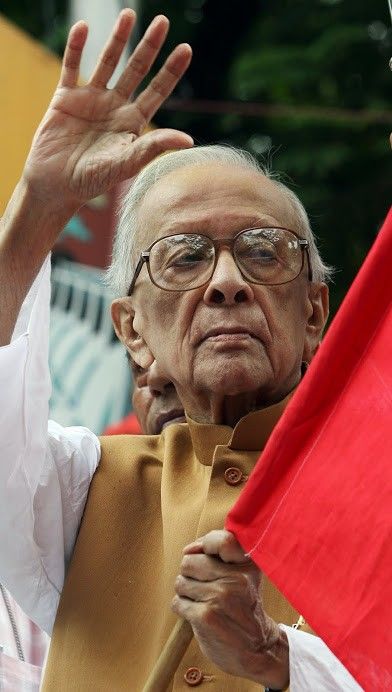Jyoti Basu: The Iconic Leader Who Transformed West Bengal (Top 10 Facts About His Legacy and Leadership)
Jyoti Basu was one of India’s longest-serving and most influential political leaders. Known for his calm demeanor, strategic thinking, and commitment to Marxist ideology, Basu left a lasting impact on West Bengal and India’s political landscape. As the Chief Minister of West Bengal for 23 years, his leadership transformed the state in many ways, from economic development to social reforms, making him a crucial figure in post-independence Indian politics. Let’s explore the life, legacy, and significance of Jyoti Basu.
Early Life and Education
Born on July 8, 1914, in Kolkata (then Calcutta), Jyoti Basu came from a family with a rich intellectual background. His father, Sarat Chandra Basu, was a prominent lawyer and social reformer, while his mother, Hemlata Basu, was a strong influence in his early life. From a young age, Basu was exposed to a variety of progressive ideas, and this intellectual environment helped shape his worldview.
Basu was educated at St. Xavier’s College in Kolkata, where he developed a keen interest in political ideologies. He was particularly drawn to the works of Marx and Lenin, which set the foundation for his future political beliefs. After completing his college education, he went to London to study law at the prestigious University College London. During his time in London, Basu became increasingly involved in socialist politics and joined the All India Students Federation, a left-wing student organization.
Political Career and Leadership
Jyoti Basu’s political career began in the early 1940s when he joined the Communist Party of India (CPI). He was deeply inspired by the struggle of the working class and the ideology of Marxism-Leninism, which called for the establishment of a classless society. Basu became a prominent leader in the Communist Party and was part of the Bengal unit, which was later transformed into the Communist Party of India (Marxist), or CPI(M).
In 1964, the CPI(M) was formed, and Basu was one of its founding members. His rise in the party’s leadership was steady, and by 1967, he was elected to the Legislative Assembly of West Bengal. Basu’s ability to connect with the masses and his strong sense of discipline and leadership soon led him to become the leader of the Left Front, a coalition of left-wing parties in West Bengal.
In 1977, Jyoti Basu became the Chief Minister of West Bengal, a position he would hold for 23 consecutive years, making him the longest-serving Chief Minister in India’s history. His leadership transformed the state, and under his guidance, West Bengal witnessed significant changes in areas like land reform, education, and industrialization.
Impact on West Bengal and India
During his tenure as Chief Minister, Jyoti Basu implemented several revolutionary policies that changed the face of West Bengal. Some of the key initiatives included:
- Land Reforms: Basu’s government was instrumental in implementing land reforms, which aimed at redistributing land from the landlords to the poor farmers. This led to a significant reduction in rural poverty and empowered the lower classes.
- Education: Basu’s government placed a strong emphasis on education, improving literacy rates and expanding educational opportunities for marginalized communities. The government expanded the number of schools and introduced policies that promoted inclusivity in education.
- Social Welfare: Basu worked towards improving the lives of workers and peasants in West Bengal. His government introduced labor reforms that improved the working conditions of laborers, particularly in the agricultural sector.
- Industrial Development: Although his tenure is often criticized for a lack of industrial growth, Basu’s focus on small-scale industries and agriculture was seen as a model for rural development. He also took a stand against multinational corporations, advocating for India’s economic independence.
- Secularism: Jyoti Basu was a staunch advocate for secularism in India. Despite being a Marxist, he worked tirelessly to maintain harmony between the different religious communities in West Bengal, promoting a culture of tolerance and unity.
Daily Life and Work Ethic
Jyoti Basu was known for his simple, disciplined, and principled lifestyle. He was not one for ostentation and led a life focused on his work and his values. Despite his high position in the government, Basu was never seen indulging in luxury. He was committed to the idea of socialism, and his personal life reflected that. His daily routine involved a lot of reading, writing, and meeting people from all walks of life.
Basu’s work ethic was legendary. He worked long hours, often at the expense of his health. He was known for his sharp intellect, and his ability to remain calm under pressure earned him respect from allies and adversaries alike. His commitment to the welfare of his people was always at the forefront, and his focus on pragmatism and social justice became the hallmark of his political career.
Frequently Asked Questions (FAQs)
1. Who was Jyoti Basu?
Jyoti Basu was the longest-serving Chief Minister of West Bengal, holding office for 23 years. He was a prominent Marxist leader and a key figure in India’s post-independence political history.
2. What were Jyoti Basu’s contributions to West Bengal?
Basu’s government implemented crucial land reforms, advanced education policies, promoted social welfare, and worked for the betterment of workers and peasants. He also emphasized secularism and national unity.
3. How did Jyoti Basu impact India’s political landscape?
Basu’s leadership of the Left Front in West Bengal and his staunch Marxist principles influenced the national political discourse. He was an important leader in the broader left-wing movement in India.
4. Was Jyoti Basu involved in any controversies?
While Basu was respected for his work in improving rural welfare and land reforms, his tenure is also criticized for not fostering significant industrial growth in the state. His opposition to multinational corporations and emphasis on public sector industries were viewed as limitations.
5. What is Jyoti Basu’s legacy?
Jyoti Basu’s legacy lies in his contributions to education, land reforms, and the promotion of secularism. He remains one of the most respected political leaders in India for his long and dedicated service to the people of West Bengal.
Key Facts About Jyoti Basu
- Born in Kolkata: Basu was born on July 8, 1914, into a well-educated Bengali family.
- Longest-Serving CM: He served as the Chief Minister of West Bengal for 23 years, making him India’s longest-serving chief minister.
- Proponent of Secularism: Basu promoted religious tolerance and worked towards maintaining harmony among different religious groups.
- Land Reforms Champion: Basu introduced landmark land reforms that empowered the rural poor and reduced feudal landholdings.
- Strong Leader: Known for his calm, strategic leadership, Basu played a crucial role in shaping the political landscape of West Bengal and India.
Conclusion
Jyoti Basu’s life and work continue to inspire political leaders, social reformers, and citizens alike. His leadership in transforming West Bengal, his commitment to social justice, and his principled stand on secularism make him one of the most iconic figures in India’s history. As one of the most prominent leaders of the left-wing movement, Basu’s influence extended beyond West Bengal, shaping the political discourse of the entire nation. His legacy lives on through the policies he implemented and the values he upheld, making him a central figure in modern Indian politics.










